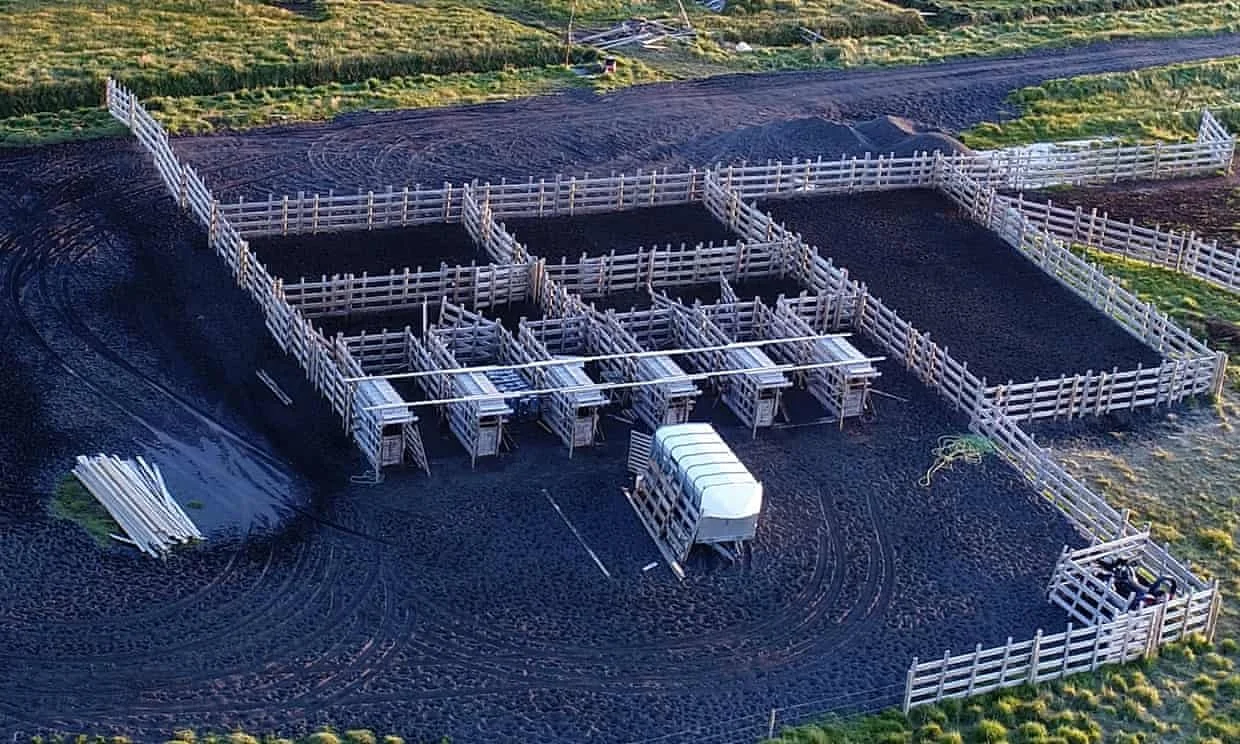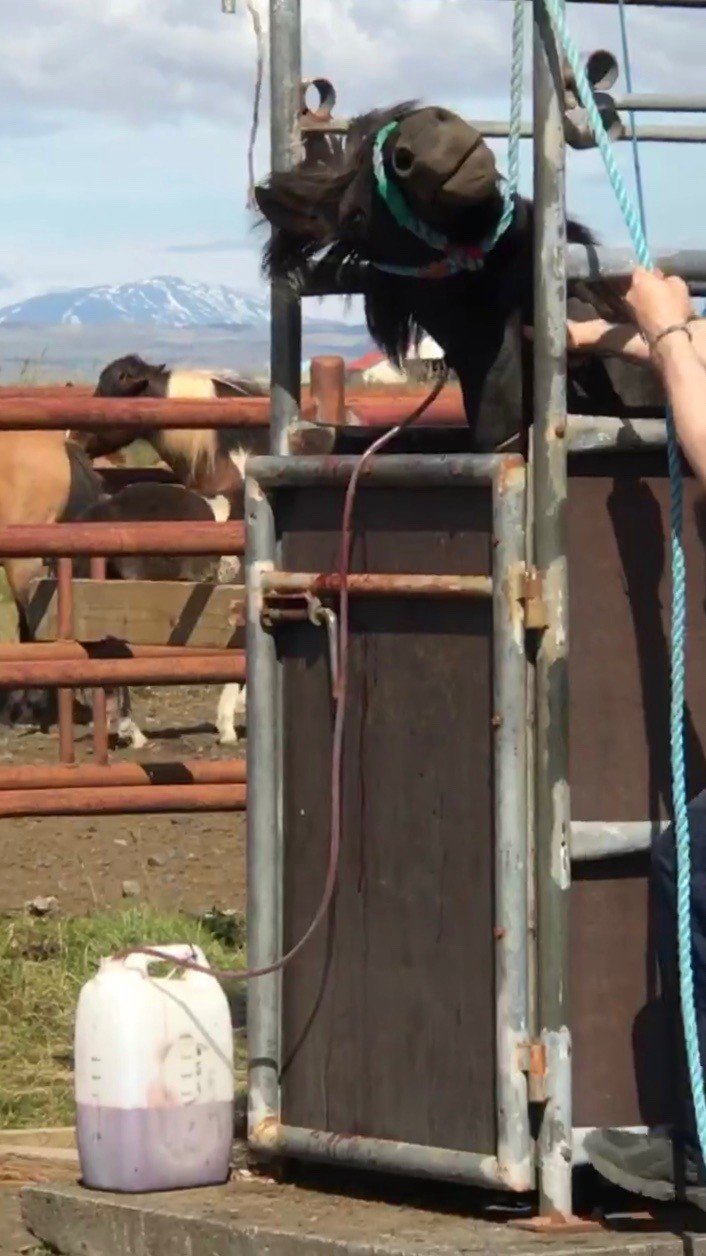Horse Blood Farms to Continue in Iceland Despite Fierce Opposition
The operations extract blood from pregnant horses to supply a hormone to the meat industry. After a shocking investigation revealed beatings and abuse, officials have announced that the farms will be monitored for the next three years while the future of the industry is assessed.
Harvesting blood from semi-wild, pregnant horses will be allowed to continue in Iceland for a further three years, despite global condemnation of the practice. During this time authorities will monitor “blood farms” while their future is assessed.
The decision comes after an investigation into the trade exposed widespread abuse on the farms, with the animals beaten with whips, rubber sticks, iron rods, or wooden planks, while vets overseeing the procedure did not intervene. Bite marks - a sign of anxiety and severe stress - were also discovered inside the horse enclosures.
The exposé also shone a spotlight on the practice that has been kept relatively under the radar in Iceland for the last four decades.
After the undercover investigation aired on television, a working group was established by Svandís Svavarsdóttir, the Minister of Food, Agriculture, and Fisheries (MFAF), to examine the operation, regulatory framework, supervision, and legislation of collecting blood from pregnant mares.
The working group has since published a new report on horse blood extraction. According to their findings, the current legal framework for the industry is vague and unacceptable, especially given the practice's controversial nature.
Svavarsdóttir has issued a new regulation, meaning that blood extraction will be subject to permit requirements - but will be allowed to continue.
“On the basis of the report, the Minister of Food has decided to issue a regulation on the operation, which will be valid for three years. The regulation will clearly stipulate what conditions the activity must meet and also that the activity is subject to licensing,” reads a statement from the Board of Directors.
"Our investigation for Animal Welfare Foundation into the blood farm business in Iceland is another example of how investigations are vital in shining a light on otherwise hidden world of Big Ag,” said Gemunu de Silva, the co-founder of Tracks Investigations, the filming agency that conducted the recent investigation into horse blood farms in Iceland.
“The recent working party report confirms that the Icelandic authorities are still unsure about the legality of the trade which we believe to be in breach of EEA law regarding the use of animals for scientific purposes.
“Whilst it is disappointing that the trade has not been banned immediately, I take hope that within the next 3 years enough pressure from both within Iceland and Internationally will put an end to this trade."
Credit: AWF
The regulation will be based on the current conditions set by the Food and Agriculture Organization, which will be strengthened by the working group’s report, stakeholders, and others who were consulted.
The most urgent provisions relate to equipment and facilities, health monitoring of the animals, temperament assessment, blood extraction methods, and the internal and external monitoring of it, according to the report.
The working group is also pushing for strengthened conditions in terms of the age range of mares used, the maximum number of horses monitored by a single veterinarian, as well as the number of stallions. They also propose having a veterinarian-assistant present during blood extraction to provide additional help if needed.
“Therefore, the group considers it necessary that an independent body, such as the Keldur Experimental Station, verify the measurements of the blood economy of the mares, at least temporarily,” reads the statement. “It is also necessary that conditions be established regarding the age range of mares to be blooded, the maximum number of stallions, and the maximum number of horses that may be blooded under the supervision of a veterinarian.”
The regulation will be valid for the next three years while a report on the morality and ethics of the practice is underway.
“At the same time, the Minister of Food considers it appropriate to propose a special review of the ethical dilemmas associated with the operation,” reads the statement.
According to the EU Commission and legal experts, procedures using animals for the production of drugs (and thus blood collections for PMSG production) are covered by EU Directive 2010/63 on the protection of animals used for scientific purposes. But, currently, the MFAF is of the opinion that horse blood extraction does not fall under the provisions of this regulation.
In efforts to combat this, a complaint for breach of EEA law has been filed to the EFTA Surveillance Authority.
What is horse blood used for?
Pregnant Mare Serum Gonadotropin (PMSG) is a hormone found in the blood of mares during the first stage of pregnancy from day 40 to 140. It is commonly used in farming to increase reproduction in pigs, cows, and other female animals across the world.
To obtain PMSG, semi-wild, pregnant horses are beaten with whips and forced into restraint boxes where their heads are tied, as revealed in undercover investigations. Then, a large-bore cannula is inserted into their jugular vein to extract the animals’ blood, in a procedure that lasts between two to three hours.
Five liters of blood are drawn from each pregnant mare every week, for up to ten weeks - this is around four times the amount specified by international guidelines. PMSG is extracted from the blood before being converted into powder and shipped globally, with Iceland, Argentina, and Uruguay being the only countries in the world that operate these “blood farms”.
What can you do?
The suffering inherent in the animal agriculture industry is becoming more and more apparent, thanks to investigations, advocacy, and raised awareness. But few people realize that equine abuse is also involved in intensive farming.
The most powerful thing you can do to protect both the horses that are being drained of blood and the animals who are being forced to reproduce at a rate far surpassing their natural capabilities is to choose plant-based foods instead.
To help you get started, Species Unite has released a What We Think, Wear and Eat Matters Starter Kit. You can download your free kit here.
The Species Unite podcast spoke with Gemunu de Silva, the co-founder of Tracks Investigations, the filming agency that conducted the recent investigation into horse blood farms in Iceland. Listen to the full conversation here.
We Have A Favor To Ask…
Species Unite amplifies well-researched solutions to some of the most abusive animal industries operating today.
At this crucial moment, with worldwide momentum for change building, it’s vital we share these animal-free solutions with the world - and we need your help.
We’re a nonprofit, and so to keep sharing these solutions, we’re relying on you - with your support, we can continue our essential work in growing a powerful community of animal advocates this year.
More stories:
Species Unite
A collection of stories of those who fight the good fight on behalf of animals.







Meat giant JBS USA misled consumers with fake sustainability claims to boost sales, the lawsuit alleges.